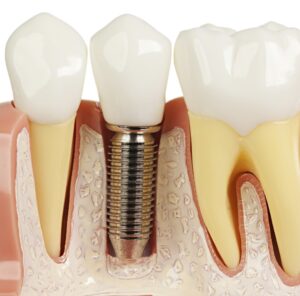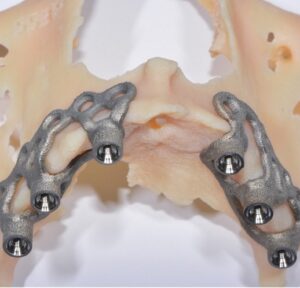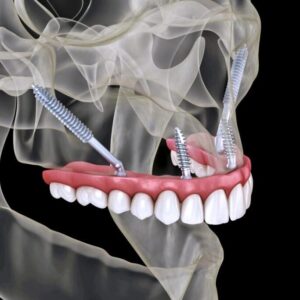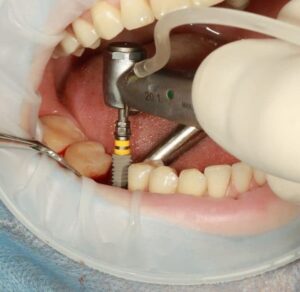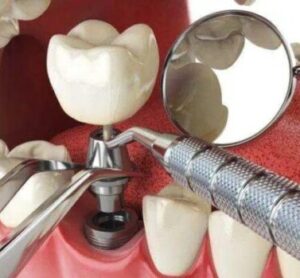
Dental implants are considered one of the most important advances in the dental market in the last decades. They are durable, perform the function of natural teeth perfectly and look great. The availability of different types of dental implants can meet the needs of people with varying degrees of tooth integrity. For this reason, dentists around the world view dental implants as the best way to restore a beautiful smile.
Patients who decide to take advantage of this treatment method have many questions. Today, you can find a lot of information about different types of dental implants on the Internet. However, it often remains incomprehensible to people who are not involved in the medical field. The Beauty by Experts Medical team will help you understand this difficult issue and tell you in simple words about the important points to consider when implanting g teeth.
What is a dental implant?
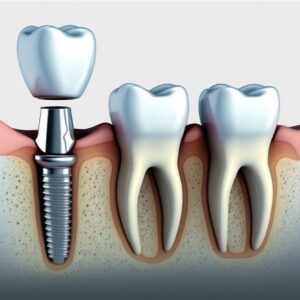
Before we look at what types of implants there are, let’s take a closer look at what they are. A dental implant is a small titanium post (screw) that is surgically placed into the jawbone below the gum line.
Regardless of the type, a dental implant replaces the root of a tooth. It fuses with the jaw’s bone tissue, preserving its structure and preventing resorption (atrophy).
Most implant prostheses consist of a screw, an abutment (adapter) and a crown, the color of which is matched to the natural shade of the teeth. In many cases, a single tooth implant is placed. This is an excellent opportunity to avoid grinding two neighboring teeth. However, certain types of implants can also replace several missing teeth or even support dentures.
With proper care, implants can last a lifetime. If an experienced implantologist performs the procedure, the probability of success exceeds 98%. Leave a request on this page and Beauty by Experts Medical will help you find a qualified doctor and clinic. We cooperate with the leading Turkish medical centers in the field of dental implants – Turkeyana, Istanbul Aesthetic Center, and Inter Dent.
Types of dental implants according to the method of placement
There are different types of implants depending on the purpose for which they are used. Each of them is designed for specific tasks. Therefore, the doctor makes the choice of implant denture after a detailed assessment of the patient’s oral health.
Endosteal type of dental implants
Endosteal implants are also called root-like implants, as they are placed inside the bone. They are most commonly used in dental practice. Usually, this type of implant is made of titanium. Over time, the screw fuses with the bone in a process called osseointegration.
After final healing, the endosteal implant becomes a secure base for further tooth restoration. The dentist can now use it to place a dental crown. The implant can also be used to anchor the supporting part of a bridge or permanent denture.
Subperiosteal type of dental implants
Subperiosteal implants are used when there is a lack of bone height or width in the jaw. The prostheses consist of a metal framework that is placed under the gum above the jawbone. This is the base for attaching screws. The installation of the subperiosteal type of implants does not require drilling the bone. In other words, the surgery is less traumatic. However, many doctors still advise the use of endosteal type implants. This is because the success rate for their placement is much higher.
Bone deficiency is a common problem. When a tooth is extracted, the bone tissue begins to resorb gradually. After a while, there is too little of it to hold the implant tightly. In most cases, the patient is offered a bone augmentation or sinus elevator, a bone augmentation procedure. If there is insufficient bone width for implantation, a surgical ridge expansion is performed. If for some reason the patient cannot or does not want to have surgery, subperiosteal type of implants are placed.
Cheekbone type dental implants
This type of implant denture gets its name because it is attached through the zygomatic bone. This technique is used when there is a serious lack of bone mass. Since the zygomatic bone does not atrophy, it is always sufficient for implant placement.
This technique is used rarely when there are no other options for implantation. The zygomatic implants are significantly longer than conventional implants. They are placed near the sinuses. Therefore, the doctor must be experienced enough to position the screws accurately. An error in implantation can lead to problems such as induced sinusitis or perforation of the maxillary sinus floor.
Different dental implant types can restore the tooth row’s integrity, even if the patient has a bone deficiency. At the preliminary consultation, the doctor will carefully assess the condition of the oral cavity and bone structure. He will then select the type of implants that will best suit your dental needs.
Zirconium and titanium types of dental implants: which are better?
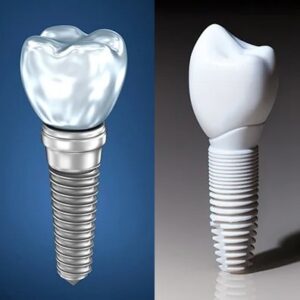
Titanium alloy is the standard material for most types of dental implants. It is highly durable and biocompatible with the body. Allergic reactions to titanium alloy are extremely rare.
Zirconium implants are also called ceramic implants because zirconium dioxide is a type of ceramic. They have appeared on the dental market relatively recently. This type of implant denture is mainly chosen by patients who are allergic to metal.
Which types of dental implants will last longer?
Many studies have been conducted on the longevity of titanium implants. They have been proven to last 25-30 years or more without any problems. Zirconium implants have only recently begun to be used. Therefore, there is not enough data to conclude their longevity.
Which types of dental implants look better?
There is an opinion that zirconium dioxide implants are superior to titanium implants in terms of aesthetic qualities. This is because zirconium screws are white, while titanium screws are gray. Therefore, the latter may show through the gum in some cases. However, when choosing between these types of implants, patients should keep in mind that if titanium screws are placed correctly, they do not affect the appearance of the smile in any way.
Which types of dental implants are safer?
All types of implants, both titanium and zirconium, are pretty safe. Both materials are compatible with the human body. However, some patients prefer zirconium dioxide because it is bioinert and does not rust.
What type of dental implants should I choose?
Zirconium dioxide and titanium implants are effective options for tooth replacement. It is best to consult with your doctor to make the right choice. You can make an appointment for a consultation with one of the leading specialists in the field of implantology – Aylin Turan, Bülent Akderli, Ertan Etemoglu. An experienced implantologist will help you evaluate the pros and cons of different types of dental implants and choose the best option.
Why contact Beauty by Experts Medical? Because we offer you unique advantages. We have been working with leading Turkish doctors for 8 years, so our patients are their priority. This enables us to guarantee that all arrangements are honored. For example, you can be sure that the treatment price will not change after your arrival and you will be seen by the dentist who conducted the consultation. We can also help you quickly resolve any post-treatment issues if they arise.
Types of immediate and delayed loading dental implants
Dental implants can take place in one or more stages. A single-stage procedure means that only one surgery is performed to place the implant. The advantage of this approach is that a quick aesthetic effect can be achieved. The patient leaves the doctor’s office with a new tooth. This method of treatment is chosen mainly to restore the front teeth, where their absence is very noticeable. The main condition for immediate loading implants is sufficient height and width of the jaw bone.
Two-stage implantation is a more reliable option. It involves two operations. At the first stage, the screw is screwed into the bone, the gum is sutured and waits for complete fusion for 2-3 months. After that, the surgeon opens the gum and installs a dental crown (the upper part of the tooth). Because there is no pressure on the tooth during the healing and osseointegration period, the likelihood of a successful long-term result is increased to 98%.
Which type of implants are better?
A two-stage dental implant procedure definitely has higher success rates but requires two surgeries. Single-stage types of dental implants are great for quick aesthetic results, provided that the patient limits the stress on the new teeth. This will require following a certain diet and not eating solid foods for 8-12 weeks. After this period, you can continue eating as usual.
Types of dental implants by functional purpose
Depending on the function, a distinction is made between single implants, bridges for several teeth and complete dentures. Each type is designed to achieve a specific clinical goal. Let’s look at them in a little more detail.
Single implants
This type of implant is perfect for replacing a single lost tooth, especially if the teeth next to it are intact. Traditional treatment involves the installation of a bridge-like prosthesis. To do this, the supporting (neighboring) teeth are ground down and crowns are placed on them. However, the preparation of healthy teeth is not the only disadvantage of the standard method. Over time, the bone tissue in the place of the extracted tooth resorbs, and an unsightly gap may appear between the gum and the intermediate part of the bridge. Therefore, a single implant in this case is the best solution.
Different types of implant-supported dentures
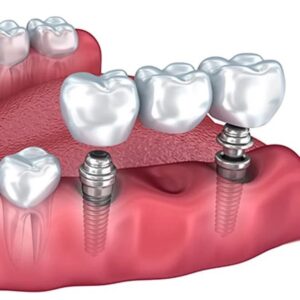 Multiple implant dentures (bridges)
Multiple implant dentures (bridges)
This type of dental prosthesis can be used to restore several teeth at once. A standard bridge can be used to replace 1-2 missing teeth. Implant-supported dentures are more versatile. They can be used to restore 3-4 teeth at once. If more teeth are needed, the doctor may recommend an additional implant to make the bridge longer.
All-on-4 or All-on-6 implant.
These types of dentures help restore a smile when many teeth are missing or full adentia is present. All-on-4 implants are a hybrid of fixed bridges and complete dentures. They can be used to replace all of the teeth in the upper or lower jaw. As the name implies, the complete denture restoration is attached to 4 or 6 dental implants. Since titanium or zirconium screws are much stronger than natural tooth roots, this number of supports is enough to hold the denture firmly in place.
What type of implants should I choose: bridge or full denture?
If the patient does not have complete adentia and the remaining teeth are adequate to hold the dentures, they do not need to be removed at all in order to place a full arch denture. In this case, the best solution is an implant-supported bridge. For example, if three teeth are missing, placing a bridge on two implant-supported bridges with three artificial teeth between them is better. It is possible, of course, to replace each lost tooth with implants, but this is an invasive and expensive procedure.
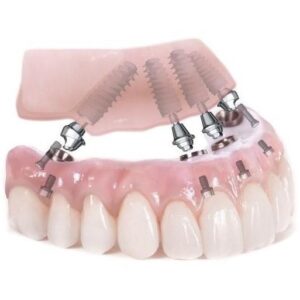
When should I choose an All-on-4 type of denture?
When teeth are completely missing, Turkish doctors recommend an all-on-4 denture. If wisdom teeth are excluded, there are 14 teeth per jaw. Only 4 or 6 implants are sufficient to support the denture. The number of screws to be placed depends on the quality of the bone tissue. If it is good, 4 screws should be placed. If it is insufficient, it is better to place 6 implants, as each of them can support the weight of more than 2 teeth. This approach increases the likelihood of successful treatment and long-term results.
Mini-Dental Implants (MDI) are also used in case of jawbone deficiency. These are very narrow and are used mainly to hold a lower jaw prosthesis.
To summarize, what types of dental implants will help you get the best results?
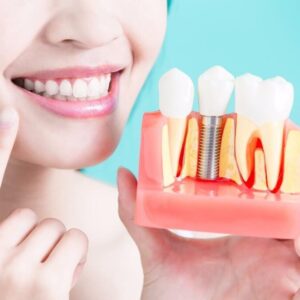
Different types of implants fulfill their specific function. Therefore, it is important to consult with an experienced dentist before making a choice. Leave a message on this page to receive a free consultation with a Beauty by Experts Medical coordinating physician. We can help you find an experienced and qualified dentist.
Turkish specialists in dental implantology and periodontology will perform a comprehensive oral evaluation and offer the most optimal solution. The Beauty by Experts Medical team will organize the treatment. You will be accompanied by a qualified doctor-coordinator at every stage of treatment – from choosing a specialist and clinic to returning home. He will always stay in touch with you and will help you to solve all arising issues. Implant placement in Turkey with Beauty by Experts Medical is fast, efficient, comfortable and safe.
Sources:
- https://www.webmd.com/oral-health/types-dental-implants
- https://www.bupa.co.uk/dental/dental-care/treatments/dental-implants/types-of-implant
- https://www.ncbi.nlm.nih.gov/books/NBK470448/
- https://www.implantandperiodonticspecialists.com/blog/dental-implant-types/
- https://www.medicalnewstoday.com/articles/327515


